Salary Stalemate
The ninth annual salary survey from Microsoft Certified Professional Magazine.
 There was a time when attaining MCP status was a gauge of success for an IT professional, back when Windows NT 4.0 was embedding itself in networks the world over, replacing big iron dinosaurs and other, highly popular network operating systems. Having a premium title like an MCSE meant not having to jockey for position among your peers.
There was a time when attaining MCP status was a gauge of success for an IT professional, back when Windows NT 4.0 was embedding itself in networks the world over, replacing big iron dinosaurs and other, highly popular network operating systems. Having a premium title like an MCSE meant not having to jockey for position among your peers.
Those days are long gone. Those who survived the dot-com era, the job cut monsoon and the outsourcing backlash may never quite rid themselves of that sense of uncertainty, especially as world economies continue to seek stability. Judging from results of the 2004 Microsoft Certified Professional Magazine Salary Survey, however, the storms have cleared and MCP salaries have indeed stabilized. "Stable," unfortunately, does not equate to "increase." "Flat" is a better way to describe it.
That's the upshot of our ninth annual salary survey, for which we received responses from more than 5,000 individuals — a number we are confident will enable us to paint an accurate picture of the MCP salary scene. (In fact, 5,000 responses yield a margin of error of just 1.5 percent, as we noted in the methodology, found here.) This year, we've added some new twists that will give you a fresh perspective on the numbers. These include reports on job satisfaction, the influences of outsourcing on careers and salaries, and how economic indicators might shape your salary.
Steady as She Goes
Despite the two-pronged threat of job cuts looming over myriad industries and the outsourcing/offshoring hype, salaries for IT professionals who managed to remain gainfully employed held steady in 2003. Average salaries for MCSEs across the board in this year's survey topped out at $61,900.
That's just a $200 bump upward from last year's average, or about 0.3 percent. The figure seems negligible — barely a blip — and way below the 11 percent rise from 2002 to 2003 in last year's survey. But consider that in each of the three years prior to 2003, our survey saw salaries decline. One explanation for the dramatic rise last year is that it was a correction — salaries had a lot of catching up to do. This year, it's back to reality. Times aren't getting much better, but at least they're not getting worse.
Here's another way to consider it: If you average this year's blip with last year's leap, the hike is still significant in comparison to other common indicators, such as the federal cost of living adjustment, which hovers around 2 percent from year to year.
| Path to Glory |
|
Dale Bogle
Network Manager
MCP (Windows NT 4.0 Workstation and Server); CompTIA A+
Annapolis, Maryland
Years in IT: 20
Salary: $79,304
Like many IT professionals, Dale Bogle got his start in the U.S. military, as an Army electronics technician. When he retired from active duty, Bogle got himself certified and embarked on a new career — one that eventually landed him a position as a network manager with the U.S. Military's Joint Spectrum Center.
"Definitely, certification helped me advance my career. I started at Help Desk and with certification have risen to Network Manager," he says. "Certification was a bigger factor in my promotions than education."
Some older IT professionals tend to dismiss certification as little more than a piece of paper, but Bogle — with 20 years of IT experience — feels it's a good indication of a person's aptitude and desire to improve.
"[Certification] shows the ability to learn and willingness to improve," he says. "You can never stop learning and trying to better yourself."
As if to prove his point, Bogle recently began exploring information security certification. "I once focused on Microsoft certs, [but] now I feel it's more important to study and understand how to better protect networks."
Bogle is happy working in IT and relishes the challenging problems he encounters as a network manager. All things considered, Bogle believes that he's "fairly compensated for [his] level of work and expertise."
— by Stephen Swoyer, a freelance technology writer based in Athens, Georgia. |
That's probably small consolation to those who didn't get a raise this year, and even less so to those who saw their salaries decline. Compared with last year, only five titles saw slight improvements, ranging from a high — if you can call it that — of 0.8 percent for MCTs to the barely perceptible 0.01 percent for MCSDs on Visual Studio 6.0. All other titles, including specializations and older titles, dipped from last year.
A few new certifications appear on this year's report. These include the MCSA and MCSE specialist titles (Messaging and Security) and MCDST. One set of results we left out of our print report — in the interest of space — are those relating to NT 4.0 titles. (Get the free PDF for the full survey results.) Although we have those numbers, they're similar to last year. We believe that next year the numbers will be consistently static, as the population of NT 4.0 title holders remains level.
Within the title striations, we are able to make some interesting observations. MCDST salaries are camped out at the bottom of the chart, as expected of a title often viewed as an entry point of IT expertise. Occupying the next tiers upward are salaries for MCP, MCSA and MCSE titles, then MCDBA, MCAD and MCTs. (Getting a headache? See for explanations of the certification level acronyms.) As for the titles-within-titles, compensation for MCSAs specializing in security is greater than those who focus on messaging. But in the MCSE arena, the same specialties are reversed; messaging folks make more than security folks. The results are surprising, given the heat generated by security issues in need of security specialists to tame them.
| 2004 Average Base Salary by Certification |
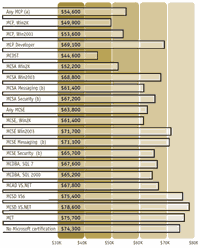
[Click on chart for full-size view.] |
| Chart 1. We asked all respondents to provide their current annual income before taxes. Excluded are all bonuses (see Chart 11a in the PDF version for that information), salaries less than $27,500 or more than $150,000, and the incomes of the self-employed. |
| Digesting Some Acronym Alphabet Soup |
|
There are more certifications in this year's survey than ever before, reflecting Microsoft's trend of adding new titles and breaking down old titles into more specific categories. Here's a thumbnail guide to the acronyms:
- MCP: Microsoft Certified Professional. This is the lowest level certification. Anyone with a higher-level Microsoft certification is also an MCP.
- MCDST: Microsoft Certified Desktop Technician. MCDSTs often work on help desks, and are skilled at troubleshooting client operating systems.
- MCSA: Microsoft Certified Systems Administrator. MCSAs normally have responsibility for taking care of the Microsoft servers in a shop.
- MCSE: Microsoft Certified Systems Engineer. MCSEs generally have duties related to designing and implementing systems.
- MCDBA: Microsoft Certified Database Administrator. MCDBAs are the Microsoft SQL experts in an organization.
- MCAD: Microsoft Certified Applications Developer. MCADs primarily write code, and deploy and maintain software.
- MCSD: Microsoft Certified Solution Developer. MCSDs also write some code, but usually have higher-level responsibilities, including analysis and design of new programs.
- MCT: Microsoft Certified Trainer. MCTs also hold a premium certification like MCSE, MCDBA or MCSD, but their primary function is training and educating users of Microsoft products.
Note also that MCSAs and MCSEs have the option of specializing in either messaging or security, but it's not a requirement. More information on the certification program is available at www.microsoft.com/learning/default.asp. |
Once again, MCSD salaries top the salary list, with MCSDs on Visual Studio .NET topping all comers at $78,600. MCSDs continue the trend of making more than their networking counterparts, to the tune of 25 percent.
Looking at where the certified masses fit within the organization, the picture is rosy for everyone except those who claim the programming project lead title and webmaster/developer/producer (see Chart 2). All other titles saw slight improvements this year, with networking project leads experiencing the sharpest increase at 10 percent.
| Salary by Job Title |
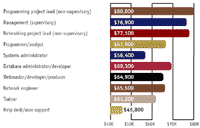
[Click on chart for full-size view.] |
| Chart 2. One of the many determining factors in salary is job title. We asked respondents to choose the title that best describes their current position. Project lead is non-supervisory, but management is. Numbers are 2004 average base salary. To find information about salary by title for each certification, see the PDF version of the results. |
When Microsoft introduced the MCSA last year and the MCDST more recently, it only made sense that we break down the job title "network engineer," as it's been called in previous surveys, into more specific categories. Our network engineer category now includes those who do high-level planning and network architecture work, with duties that go far beyond server maintenance. "Systems administrators" (SAs) are those responsible for the day-to-day management, care and feeding of servers. SAs debuted this year at $56,400, which is in the ballpark average of salaries after combining MCDSTs and MCSAs with and without specializations.
| A Fistful of Certs |
|
Luke Edson
Consultant
CCIE, CCNP, CCNA, CISSP, MCSE (NT4.0, Windows 2000 and 2003), MCSE Messaging, MCSE Security
Dallas, Texas
Years in IT: 14
Salary: $150,000
Few IT professionals have more certifications than Luke Edson, a self-employed consultant.
At last count, Edson had three Cisco certs (including the all-powerful CCIE), a CISSP, and five Microsoft certifications, including his Windows NT 4.0, Windows 2000 and Windows Server 2003 MCSE, as well as his MCSA. And he's not finished by a long shot: "I take a cert test every two or three months. That way, I can stay ahead, and I don't have to cram when my certs expire."
Edson got his start in IT as a computer technician, which helped him become intimately familiar with the innards of computers. By the mid-1990s, he'd moved on to consulting. Along the way, he'd started collecting certs.
"I started accumulating the certs, as I'm generally not satisfied with staying where I'm at and always need to get better at what I do," he says. IT is an intensely competitive field, especially for an independent consultant, and Edson believes that his armada of certifications has made the difference on more than a few occasions. "Certification has been a huge reason for all of [my success], especially being able to stand out above my peers when new jobs come down the pipeline," he comments.
Edson is excited about working in IT, in spite of the recent downturn. "Whether companies like IT or not, they've got to keep putting money into it," and says. "There will always be work, whether there's an economic downturn or not."
Nevertheless, Edson admits that he's troubled by the offshore outsourcing phenomenon, which has hit uncomfortably close to home on a few occasions. "The whole outsourcing issue has been a sour note, and in my opinion, will weaken the United States in the long run," he says. "I can definitely say it's affected my job prospects, and desire to stay in IT, but it hasn't hit me as hard as less-skilled workers I know."
— S.S. |
The Value of Paper — and Experience
The value of certification to one's own salary is debatable — the diet plan axiom "individual results may vary" applies to certifications (see Chart 3). More than half of all respondents, 51 percent, believe their compensation went up by some small measure, with at least one-quarter of the lot experiencing a windfall of more than 10 percent. Financial gain wasn't the primary motivator for achieving certification though. Most respondents, 75 percent, say they wanted to be certified mainly for personal reasons (see Chart 13, "Reasons for Certification," in the downloadable PDF version of this survey).
| Effect of Microsoft Certification on Salary |
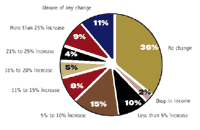
[Click on chart for full-size view.] |
| Chart 3. Most respondents felt that a Microsoft certification has no effect on salary. Consistent with 2003, 10 percent give your certification at least some credit for a slight increase, while 15 percent of you believed your title was responsible for getting you an increase of 5 to 10 percent. The average rise for those who experienced an increase was 8.5 percent. To use a national measure for comparison, MCPs believe they received about 5 percent better than the 2004 U.S. government cost of living adjustments, which is 3 percent to 4 percent (see www.dtic.mil/perdiem/rateinfo.html). |
Indeed, when we asked how many respondents were planning to attain a new or upgraded certification in the next 18 months, only 4.2 percent said they had no such plans. Clearly, even if they don't think certification has the value it once did in terms of helping them command a better salary, IT pros do believe it has intrinsic career value. Many believe they need it in order to make moves up the career ladder, while others see it as the first step into an IT career.
If it's strictly a high salary you're after, Chart 5 shows there's no substitute for experience. The most profound leaps in salary occur with the MCSE specializations, where salary nearly doubles with 10 years of experience. Across the board, and for those titles that we can compare to 2003 figures, respondents with one to two years experience were much in line with last year. The only anomaly exists among MCDBAs on SQL 7, who reported making 30 percent more than respondents who claimed three to four years of experience and even a slight lead over those with five to nine years of experience.
| Salary by Experience |
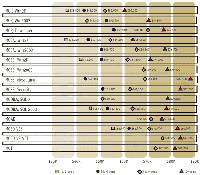
[Click on chart for full-size view.] |
| Chart 5. These numbers represent only the average 2004 base salary. As expected, salaries increase with experience. The question we asked was, “How many years have you held a job that specifically involves computer networking/programming?” This question doesn’t reflect direct experience with Microsoft products. Also, it doesn’t include responses for self-employed professionals. Note: Results for MCDST were insufficient to include in this year’s survey. For information on salaries by experience for other titles, see the PDF edition of the survey results. |
| The Throwback |
|
Jennifer Mocherman
Network Administrator
MCSE (WinNT 4.0 and Win2K), MCP+I, MCP
Bryan, Ohio
Years in IT: 15
Salary: $50,000
Many certified IT professionals got their start in the late 1990s, drawn by promises of good pay and job security. There was a time though, when folks were drawn to the field because they couldn't imagine doing anything else. Call Jennifer Mocherman a throwback.
"I have pretty much always wanted to work with computers. I started in high school when I decided to go to a vocational school my junior and senior year," says Mocherman, who is now a supervisor of data and voice communications with an Ohio-based manufacturer of heating and air conditioning products. "Since then, I have continued exploring different areas of IT."
She obtained her first certification (a Windows NT 4.0 MCSE) as one of the conditions of employment on her first job, in networking. Since then, Mocherman has kept her certification "mostly up to date." She says that being certified has helped to win her raises, obtain job security, bolster her confidence and make her a more competent IT professional. "You tend to learn a lot when you study for the exams," she says.
Times were tough during the economic downturn, but Mocherman never thought about switching careers. "No matter what happens with the [economy], companies still need someone to run their networks," she says. No matter what the economic climate is like, keeping up with certs is a must: "You definitely have to work at keeping up with all the new technologies that come along in IT."
Mocherman feels that she's fairly compensated, even if she's not earning as much as some of her peers. "The cost of living in a smaller town is much less than larger cities," she notes.
— S.S. |
Will Defrag for Food
Of course, you're not gaining experience when you're not working. With IT jobs riding a roller coaster of cuts and creation this year, it made sense to find out how respondents were faring. At the time of the survey, 9.5 percent said they lost a job in the 12 months leading up to the survey (see Chart 4a). That figure outpaces the national labor force, which had a 5.6 percent unemployment rate in the first quarter of 2004, according to the U.S. Bureau of Labor Statistics. The large number of unemployed also explains why salaries aren't going up — too much supply to meet demand. Indeed, of those in our survey who hit the unemployment line, only about one in four were unable to find gainful employment as indicated in Chart 4b.
Have You Been Laid Off in the last 12 Months?
Have You Been Rehired/Found a New Position? |

[Click on charts for full-size view.] |
| Charts 4a, 4b. With the threat of job loss weighing heavily in the IT sector in recent years, we asked a new question in this year’s survey. Chart 4a shows that IT layoffs outpaced the national unemployment average (around 5.6 percent, according to the U.S. Bureau of Labor Statistics; see data for all of Q1 at www.bls.gov/) at the time of the survey. Of those who did lose their jobs, Chart 4b shows that many of them found a new job or were rehired, while a little more than one in four were still looking. |
One factor contributing to unemployment is outsourcing. Moving IT jobs to countries like India, Pakistan and eastern Europe where labor is cheap has become an election-year issue, with opinionated advocates on each side. Programmers and help-desk support personnel are particularly prime outsourcing targets.
We found the wave is starting to hit the MCP community. As Chart 7a shows, 8 percent of those surveyed lost jobs to outsourcing in the last 12 months. Four percent did find work with the outsourcer, however (an aspect of the movement not often discussed), so the net loss of jobs among respondents was 4 percent.
| How Outsourcing Has Affected Jobs |
Impact of Outsourcing
on your Job? |
Will Outsourcing Impact
You Next Year |
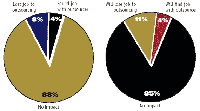
[Click on charts for full-size view.] |
| Charts 7a, 7b. With outsourcing being a major topic of discussion as we began preparing this year’s survey, we decided to find out what impact it has had on the MCP community. By the response, the impact seems minimal. |
Prospects for next year may be gloomier. Eleven percent expect to lose their jobs to outsourcing and only 4 percent figure they'll land a job with an outsourcer. Keep in mind that these figures are U.S.-based respondents, so foreign workers aren't factored into these results.
Historically, network and systems administrators have been relatively safe from the affects of outsourcing, possibly because it's often important to be physically near servers to service them. But our survey shows they were as vulnerable as programmers to outsourcing in the past year. Among MCSEs in the survey, 7 percent lost jobs to outsourcing, the exact same percentage as MCSDs, whose specialties include writing code and software development. On the other hand, twice as many MCSEs and MCSDs — 4 percent to 2 percent — found jobs with outsourcers.
| Reversal of Fortune |
|
Julie Kinnett
MCSE (NT4), CTT, MOS (Expert)
New York, New York
Years in IT: 9
Salary: $65,000
A decade ago, Julie Kinnett was at an impasse. She'd left a career in fundraising to take an interim job at a bank, but had no idea what her next move would be. That changed when her employer sent her for training on Microsoft's Office 4 suite. Kinnett found that she had a natural aptitude for technology and quickly became her company's resident Office guru, unofficially training colleagues in Word, PowerPoint and Access.
The rest, as they say, is history. "I applied for a job with the AT&T Professional Development Center and was hired as an applications trainer," she says.
Because she worked for a training company, Kinnett was able to pursue her Networking Essentials, Windows 95, Certified Technical Trainer and Microsoft Certified Trainer certs for free. She then took a year off to study for her MCSE. But by the time Kinnett passed all of the relevant exams, the job market had started to dry up.
"It was difficult, given my limited experience, to find a systems administrator or network administrator position," she says. "However, having the MCSE certification was very helpful in obtaining my current position as a Senior Technical Trainer."
Kinnett plans to pursue Windows XP or Windows Server 2003 certifications in the future. "The certifications have given me credibility, which is very useful when competing for a new consulting job or conducting a technical training class for new students. And as a woman in the technical field, I find this credibility to be invaluable."
— S.S. |
The Value of Other Certifications
One thing MCPs can do to help protect their jobs from outsourcing is to develop non-Microsoft skills. When they do, the first certification often obtained is CompTIA's A+. After a few years on the job, MCPs often see their duties expand. Many feel the need to get up to speed on Cisco or Citrix technologies and get certified to prove their non-Microsoft expertise. It's also a good career move, as current and prospective employers are often impressed by having expertise in more than just Windows.
Our survey offers stark evidence of the benefit of having non-Microsoft certs in your portfolio. For instance, having the letters "CC" at the start of your credential is generally a very good thing. As Chart 6 shows, Cisco Certified Internetworking Experts (CCIE) average $112,000 per year, topping the list. The Cisco certs CCSP ($77,200) and CCNP ($78,300) are also high on the list. Other well-known non-Microsoft certs held by top earners include the security credential CISSP ($86,900), Sun Solaris ($76,000) and the Linux certification from Red Hat, the RHCE ($75,600).
| Salary by Other Certifications |
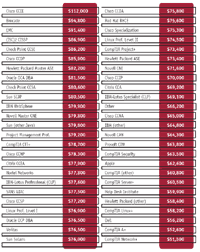
[Click on chart for full-size view.] |
| Chart 6. We asked respondents what certifications they held other than those from Microsoft. Numbers are 2003 average base salaries. As with many comparisons, there are myriad variables (such as experience and multiple certifications) that influence compensation other than the title itself. |
In terms of which non-Microsoft certifications are most popular among the MCP crowd, CompTIA's A+ cert continues to be king. Forty-eight percent hold the hardware-based title, down slightly from 51 percent last year. The next most popular certification was Cisco's CCNA, held by 26 percent of respondents. CompTIA's Network+ was next, with 22 percent, followed by the Novell CNA (remember that?) at 19 percent.
So, what certifications are in your sights for the next 18 months? Well, 36 percent said it's the CCNA. In second place is CompTIA's Security+, at 16 percent. In fact, of the top six non-Microsoft certifications for which MCPs will be gunning, five are either CompTIA or Cisco. In what might be construed as good news for Redmond, most MCPs aren't interested in getting Linux certified. The top vote-getter was the Linux Professional Institute Level I credential, but less than 6 percent of survey-takers were considering it.
| Certified Shamus |
|
Patrick S. Harper
Information Security Engineer
CISSP, RHCT, MCSE
Dallas, Texas
Years in IT: 10
Salary: $93,000 a year
IT wasn't Patrick Harper's first career choice — that would be private investigation. But after five years in the PI racket failed to yield the proverbial red Ferrari or gig in Hawaii, IT seemed like Harper's best bet.
It was, he says, a no-brainer: He got his first computer at the age of nine, and as a teenager immersed himself in the online world of BBSes. Small wonder, then, that Harper describes his work in IT as "like a hobby with a paycheck."
He got his start working for ISPs, where he was able to parlay his passion for sleuthing into a successful career as an information security professional. "I fell in love with infosec … and started devoting as much time as possible to learning the ins and outs of security," he says. He got his first cert, the CISSP, during the heyday of the dot-com boom, when he realized certified professionals were commanding significantly higher salaries.
"Many of the current certs prove you have skill just by having the cert. Red Hat has no written exam anymore; it's all hands on," he says. "CISSP makes you have four years in the field before you can even take the test. Things like that are good for certifications. They bring a lot of respectability back."
Harper currently works for a company that specializes in IT management and services for healthcare organizations, and says that thanks to regulatory legislation such as the Health Insurance Portability and Accountability Act (HIPAA), his skills have never been more in demand. He may not be driving a shiny red Ferrari 308 GTB, but he's having fun and is upbeat about his future in IT.
— S.S. |
Specialization Pays
Going outside Microsoft for additional certifications can help, but so can expanding your knowledge within the Microsoft realm. Knowing Windows 2000 Server and Windows Server 2003 is good, but if you really want to bump up your paycheck, consider drilling down into some of Microsoft's other products, especially some of the lesser-known ones.
According to Chart 8, those with knowledge of Identity Integration Server earn a lofty $81,000 on average, $16,100 more than those with just Windows 2003 expertise. Next on the list are BizTalk Server ($79,900), Project Server ($75,300) and Live Communications Server ($74,300). Live Communications Server, released late last year, is an example of the benefits of quickly getting up to speed on a new technology; it's fourth on the list of highest-paying specialties. In the 2003 salary survey, BizTalk Server was tops at $82,100, with Commerce Server ($81,900) second and Content Management Server ($73,400) third. For those in super-high-end shops, it's worth noting that MCPs with Windows 2003 Datacenter Server expertise garnered an average salary of $74,200.
| Average Salary by Microsoft Expertise |
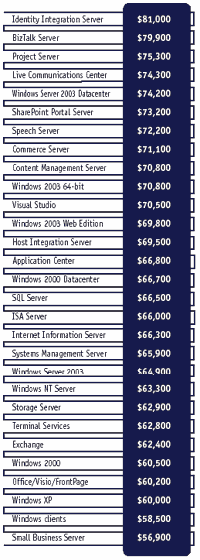
[Click on chart for full-size view.] |
| Chart 8. When it comes to compensation by level of Microsoft expertise, newer technologies tend to bring in the higher salaries. It’s likely that professionals working with these more specialized technologies also typically have more experience and are, therefore, better paid. |
Location, Location, Location
It isn't just what you know that determines your income. Where you live, naturally, also has a lot to do with how much you make. City-dwellers generally make more — and often, substantially more — than their rural IT counterparts.
Of the 37 cities surveyed, the one with the lowest MCP salaries was San Antonio, Texas, at $51,800. Most other cities were much higher, including Washington, D.C., and San Jose, California, where IT folks make the most money, an average of $74,900. Other large cities where you can expect to do well include San Francisco, New York and Boston. Of course, since a decent meal in Manhattan will set you back about the same amount as seven great meals in Sioux Falls, South Dakota, it's all relative.
Broken down geographically, the raw numbers show that you're likely to make the most money in mid-Atlantic states or the Northeast. The mid-Atlantic region, home to 18 percent of respondents (941 folks), led the country with an average salary of $64,400 — edging out the Northeast by just $100. The Northeast, however, also has the lowest number of MCP respondents, at fewer than 10 percent. The Western region, home to 24 percent of survey-takers, came in third in average salary at $63,100. That may seem surprising, considering the West includes the San Francisco Bay area, Los Angeles, Silicon Valley and the Seattle area, but it also includes states like Wyoming, Montana and Utah, with small cities, large rural areas and fewer IT companies.
Rounding out the rest of the nation are the Midwestern states, where 20 percent of our respondents live, with an average salary of $60,200, and the South, home to the largest percentage of respondents (29), but firmly in last place in average salary, at $58,600.
| The Accidental Techie |
|
Stephan Bren
Senior Engineering Analyst
MCSD, MCSE
Washington, D.C.
Years in IT: 10
Salary: $87,000
As an environmental analyst under contract with the federal government, Stephan Bren knows a little something about the effects of climate change. In 1994, when he sensed the political winds had swept in a new Congress whose priorities might put his job in jeopardy, he decided to find a new line of work.
Bren turned to IT, securing a transfer within his company, a large IT services provider. He became a technician installing network and computer equipment.
"I didn't really look at IT seriously as a career, but merely as a means to remaining employed while I prepared to enter medical school, which I did at the ripe age of 35 in 1998," he says.
Outside events once again intervened. Soon after he enrolled in medical school, Bren's mother became desperately ill. To help support her, he dropped out and worked as a technical writer with Microsoft, pursuing certification on the side.
He's been racking up certifications ever since. "To date, I have the MCSE, the MCSD [Visual Studio 6.0], and am now working on the MCDBA and the MCSD .NET," he says."Attaining a certification demonstrates a base of knowledge in a particular area, not capabilities, which are what you learn on the job."
Oh yes, the job. Bren is back with the same IT service provider that gave him his start, but now he's a senior engineering analyst focused on software development. He also teaches programming at an area college, that is, when he's not hitting the books himself.
"Every day I devote a few hours to studying programming methods," Bren says.
— S.S. |
Hope for the Future
One of the new questions we asked this year deals with your outlook for the future. With all the challenges facing IT workers, including outsourcing, budget cutbacks and constant security threats, we wanted to know if you think you'll still be working in IT in five years. Overwhelmingly, you said that you'll put up with all the hassles and headaches, all the screaming bosses and users who still think it's OK to open e-mail attachments as long as it's from someone they know.
By a margin of 88 percent to 11 percent, you expect to stick with it for another five years.
Interestingly, those working with older technology are generally more likely to believe they won't be in the field that long. That includes MCSEs on Windows 2000, MCPs on Windows 2000, MCSAs on Windows 2000, VS 6.0 MCSDs and MCDBAs on SQL 7. Respondents with those certifications were at least twice as likely to be pessimistic about working in IT as those certified on Windows 2003, VS.NET or SQL 2000. The group with the highest percentage of pros who think they won't be working in IT in five years? MCTs, at 12 percent.
Still, it should be noted that these are still very low figures, and they indicate a strong, optimistic feeling among most MCPs about their future prospects.
It's the Economy, Stupid
Most MCPs may feel good about the future, but are less confident about the present, at least in terms of the economy. According to nearly all standard economic indicators, the U.S. has been out of the recession for some time now. But, for the most part, MCPs still feel like they're being squeezed.
This was borne out strongly in our survey, when we asked "Do you think the U.S. IT industry is still in an economic downturn?" Fully 60 percent said yes, while only 31 percent said no. The remainder was undecided. There's also a strong belief that if things don't improve in this sector soon, there will be more bloodshed. When we asked if a continued downturn would have an impact on your career, 35 percent of you said yes, while 20 percent said no. Twelve percent didn't know what the impact was likely to be.
Whatever becomes of the IT economy in the near-term, most of you believe your certification has helped, or will help, your career. If the perceived downturn continues, 52 percent of respondents believe their certifications will assist them in landing a job. On the other hand, a startlingly high 45 percent think that their Microsoft credentials won't help at all. That may be due to the growing belief that certifications are more of a self-fulfillment goal, rather than a career aid.
Still, an overwhelming 75 percent of survey-takers think the overall impact of their credentials on their careers has been positive, compared to 24 percent who think it hasn't helped, and less than 2 percent who think their certifications have actually hurt their careers. It would be safe to bet that those 2 percent have heard the phrase "Paper MCSE" a little too often.
For those currently in the market for a new job, it may be some comfort to know that a plurality of those surveyed expect their companies to be hiring in the next year — a Florida-election-thin plurality at 37 to 36 percent, but a plurality nonetheless. Of the hiring companies, 56 percent expect to hire between one and five folks, 9 percent think they'll hire six to 10 new workers, and — a very encouraging statistic — about 8 percent believe their companies will be adding more than 30 IT people to their employment rolls. (And no, we can't give you the names and addresses of those companies.)
So What Does it All Mean?
It's clear that certification doesn't mean what it used to. We hear time and again that Microsoft certifications don't normally translate into higher salaries, bigger bonuses or better perks, and this year's salary survey adds to that body of evidence. There was a time, during the height of the Internet frenzy, when an MCSE really could get a well-paying job with little experience, thanks to that magical acronym after his name.
Those days have gone the way of the Dodo bird and multibillion dollar IPOs. But that doesn't mean there isn't any value to certification. All other factors being equal, an MCSA or MCSD might just give you a bump over other candidates when promotions are being discussed. The problem is, all other factors are rarely equal. Experience, same as it ever was, is still the most crucial factor.
| More Charts |
|
 The PDF format of this story boasts many more charts, including additional compensation offerings, reasons for certification, salaries for the self-employed and salaries by industry. It also includes an extensive chart listing salary breakdowns by type of certification for 38 cities — an invaluable tool. Free registration is required to get the PDF, available here. The PDF format of this story boasts many more charts, including additional compensation offerings, reasons for certification, salaries for the self-employed and salaries by industry. It also includes an extensive chart listing salary breakdowns by type of certification for 38 cities — an invaluable tool. Free registration is required to get the PDF, available here.
| |
|
|
Certification, however, does demonstrate a number of positive qualities in an employee: a desire to keep up with new technologies, an inquisitive nature and a drive to take on challenges. Although it's impossible to quantify in a survey, there may even be a hidden benefit of certification: To be seen by a supervisor or prospective employer as the type of person who is willing to work toward a goal for personal satisfaction, as opposed to solely for monetary gain.
Additionally, the general economy is certainly improving. Even if IT is lagging behind other sectors, it will eventually have to catch up. Hiring is on the upswing, and companies like Microsoft, IBM, HP and others are continuing to push the boundaries of software and hardware development. All those companies, and thousands of others, are going to need bright, experienced, dedicated people to continue moving forward.
In the end, the factor that will determine how much money you make is how well you do your job. And that's often determined by how much you like your work. If you get certified only because you think you'll cash in on payday, you're likely to see your job as nothing more than a means to the end of a comfortable lifestyle. If, however, you enjoy what you do, have a passion for IT, and see certification as a way to learn more about this fascinating world, chances are the financial rewards will follow.
Additional research for this story provided by Dian Schaffhauser.
About the Authors
Michael Domingo has held several positions at 1105 Media, and is currently the editor in chief of Visual Studio Magazine.
Keith Ward is the editor in chief of Virtualization & Cloud Review. Follow him on Twitter @VirtReviewKeith.